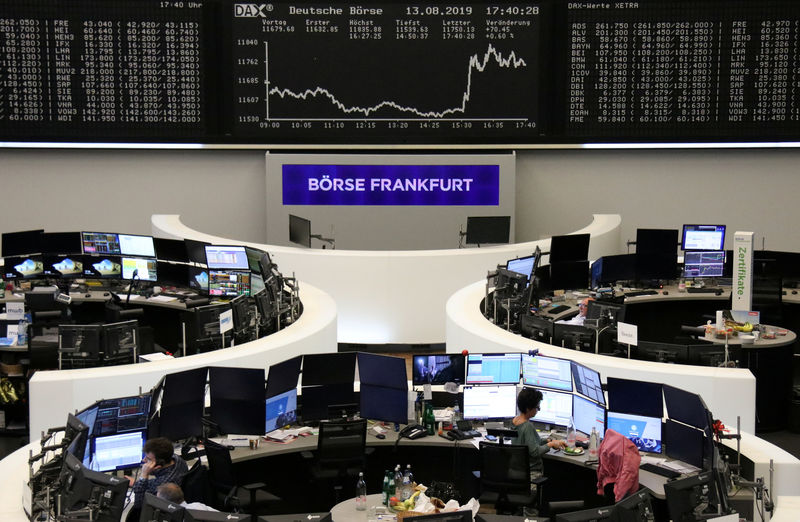By Agamoni Ghosh and Shreyashi Sanyal
(Reuters) - European shares fell on Wednesday, as a shrinking German economy and weak industrial data from China stoked fears of a global slowdown, forcing investors to turn defensive and overshadowing a temporary U.S.-China tariff truce.
The pan-European STOXX 600 index (STOXX) fell 0.2% by 0820 GMT, with banks (SX7P) weighing on the benchmark, while the defensive healthcare (SXDP), utilities (SX6P) and telecom (SXKP) sectors outperformed.
U.S. President Donald Trump's administration delayed imposing a 10% tariff on certain Chinese products, including laptops and cell phones, beyond September on Tuesday, providing battered equity markets world-wide some relief.
However, weak industrial data from China and a contraction for export-reliant German economy in the second quarter was a reminder that the impact of the drawn out trade war between the United States and China is far from over.
"The German GDP numbers kicked off the day badly for European markets, outweighing the limited positive impact from the Trump tariff relief," said Chris Beauchamp, chief market analyst at IG Group in London.
The Frankfurt-dominated auto index (SXAP) fell more than 1%, while borrowing costs in Germany fell to fresh record lows following the GDP data, reinforcing expectations for monetary policy stimulus soon.
Market participants are now keeping watch for a read-out of second quarter GDP numbers in the eurozone due later in the day.
Stalled growth across Europe has been led by a slowdown in the eurozone's largest economy, Germany, while the fallout from Washington's trade war with China, Brexit uncertainty, and Italy's political woes have also plagued the trading bloc.
"If Germany sneezes the rest of us catch a cold, so this is a particularly depressing outlook for the euro zone and reinforces the view that outside the U.S. things aren't going well." said Beauchamp.
In corporate news, shares of Swiss elevator and escalator manufacturer Schindler (S:SCHP) fell 4.3% after it reported a 22% drop in second-quarter profit, dented by wage inflation, higher material costs, foreign exchange, and planned higher costs.

Balfour Beatty Plc (L:BALF) shares jumped 9% after the British infrastructure company reported higher first-half underlying pretax profit and increased its annual cash forecast.